International conference on enabling technologies: Infrastructure for collaborative enterprises (WETICE)
1 Content of the issue
Organizational studies and analyses of distributed engineering processes and other cooperative activities in the areas of training, expertise or distance education show business needs into solutions for organizing their activities around a workspace that can be shared or distributed and virtual. In this era of global competitiveness, the economic space reflects a constantly reorganizing movement, in which companies are globalized and internationalized 1. And this leads in both cases to an organization in teams, units or task forces increasingly geographically distributed. The procedures for design and engineering are being redefined to fit the new organization by anticipating solutions to avoid the disadvantages of this new organization, on one hand, and to benefit from its advantages on the other hand. This resulted in a need for research on a new organization of group activities, new generic software used in various fields of activities and new architectures for software specific to a particular area of activity. Different research areas are affected by this issue and are classified under the multidisciplinary theme of collaborative enterprises. Several research teams from the academic and industrial worlds have examined the emerging problems of the distribution of traditional engineering activities and the creation of new collaborative work procedures. Context-awareness in collaborative systems is being investigated for emergent technologies such as machine to machine (M2M) technologies 2. The multiplicity of requirements, both from the organizational and software point of views, for these studies makes them a sought after multidisciplinary field in which we can distinguish different disciplines, different applications and different views for each discipline and for each application. Autonomic computing, and cloud computing 3, service-oriented architecture and Web services for both real-time 4 and standard applications 5, as well as aspect-oriented programming 6 are becoming key technologies for designing and implementing collaborative systems.
In an effort to disseminate the recent advances in this field and to stimulate discussion on the future research directions while enabling research interests toward the development and applications of collaborative systems, a special issue of Wiley Concurrency and Computation: Practice and Experience has been dedicated to recent developments in collaborative systems. This special issue presents a total of nine papers in the most active areas of research in collaborative systems.
The paper by Nesrine Khabou et al. 7 titled ‘Threshold-based Context Analysis Approach For Ubiquitous Systems’ proposes an analysis approach for collaborative ubiquitous systems. The approach aims at analyzing context information and detecting significant abnormal changes using thresholds for tracking down context changes.
The paper by Fatma Krichen et al. 8 titled ‘Development of Reconfigurable Distributed Embedded Systems with a Model-Driven Approach’ presents a methodology to design reconfigurable distributed real-time embedded systems with temporal and resources constraints. A model-driven engineering approach is adopted to handle the complexity of the design and implementation process.
The paper by Mahdi Ben Alaya et al. 9 titled ‘FRAMESELF: An ontology-based framework for the self-management of M2M systems’ proposes a framework implementing the different steps of autonomic management for M2M networks. The approach uses representation based on ontologies and graphs to describe the M2M concepts and relationship.
The paper by Mohamed Sellami et al. 10 titled ‘A Decentralized and Service-Based Solution for Data Mediation: The case for Data Providing Service Compositions’ deals with Web services and semantic mediation and addresses the problem of data heterogeneity in service composition. The authors propose a service-based approach for automatically inserting appropriate mediation services in Data-as-a-Service compositions to resolve structural heterogeneities in their data flow.
The paper by Kevin Brown et al. 11 titled ‘Fine-grained filtering to provide access control for data providing services within collaborative environments’ deals with Web services for data retrieval and semantic annotation using ontology-based descriptions. The defined approach relies on a filtering ontology allowing to extend extensible access control markup language policies to reference filtering classes.
The paper by Antonio Cuomo et al. 12 titled ‘Planting Parallel Program Simulation on the Cloud’ introduces a cloud-based concurrent simulation framework for efficient performance prediction of parallel programs. The accuracy and the validity are proven through a case study.
The paper by Magdalena Punceva et al. 13 titled ‘Incentivising Resource Sharing in Social Clouds’ addresses cloud applications for social networking. An incentive approach is elaborated for resources sharing. The approach has a significant potential for improving resource utilization and making available additional capacity.
The paper by Emiliano Tramontana et al. 14 titled ‘Providing QoS strategies and Cloud-integration to Web Servers by means of Aspects’ proposes an aspect-oriented approach for handling of QoS parameters. The approach is applied to improve the performances of Web servers.
The paper by Nicola Capodieci et al. 15 titled ‘Context-awareness in the Deregulated Electric Energy Market: an Agent-based Approach’ proposes a context-aware agent-based approach for simulation. The case of energy market is studied for the future smart grids. Different context parameters are considered including weather forecasting.
Acknowledgements
The guest editors of this special issue would like to thank all referees for providing thoughtful and knowledgeable reviews and for their substantial contributions to the final revised versions appearing in this special issue. They also would like to thank the Wiley Concurrency and Computation: Practice and Experience editor in chief, Professor Dr. Geoffrey Fox, for his valuable suggestions and all the authors who have submitted to this special issue.




